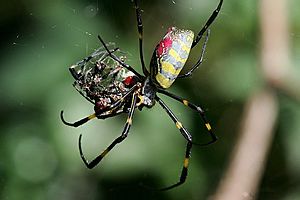Cannibalism in animals facts for kids
In zoology, cannibalism is when an animal eats another animal of its very own species. It's like a creature having a meal that's also its relative! This behavior has been seen in over 1,500 different kinds of animals. It is quite common among insects, spiders, and scorpions.
Contents
What is Animal Cannibalism?
Animal cannibalism is a natural behavior where one animal consumes another animal from the same species. It's not always about being mean or aggressive. Often, it's a way for animals to survive in tough conditions. This behavior happens in many different parts of the animal kingdom, from tiny insects to large mammals.
Why Do Animals Eat Their Own Kind?
There are several reasons why animals might practice cannibalism. These reasons are usually linked to survival, competition, or even reproduction.
Survival and Food
One of the main reasons for cannibalism is simply to get food. If food is scarce, an animal might eat a smaller or weaker member of its own species to avoid starving. This is especially true for young animals or eggs, which are easy targets. For example, some fish will eat their own young if there isn't enough other food around. This helps the adults survive so they can reproduce again later.
Competition and Control
Cannibalism can also be a way to reduce competition. If there are too many animals in one area, eating some of them can mean more food and space for the survivors. This is often seen in tadpoles, where larger tadpoles might eat smaller ones to get more resources. Sometimes, it's also about controlling a group. A dominant animal might eat others to show its power or to remove rivals.
Reproduction and Mating
In some species, cannibalism happens during or after mating. A famous example is the praying mantis or the black widow spider. The female sometimes eats the male after they mate. Scientists think this gives the female extra nutrients. These nutrients can help her produce more eggs, making sure her babies have a better chance to survive.
Who Practices Cannibalism?
Cannibalism is found across many different animal groups. It's not just a rare or strange behavior.
Insects and Spiders
Many insects and spiders are known for cannibalism. As mentioned, praying mantises and black widow spiders are famous examples. Some beetle larvae also eat each other, especially if they are crowded. This helps control their population.
Fish and Amphibians
Cannibalism is quite common in fish. Many fish species eat their own eggs or young. This can happen if the parents are stressed or if there isn't enough food. Tadpoles, which are young amphibians, also often eat smaller tadpoles or eggs.
Birds and Mammals
While less common than in insects or fish, cannibalism does occur in some birds and mammals. For example, some birds might eat their own eggs if they are damaged or if the nest is disturbed. In mammals, it can happen in very extreme conditions, like starvation. Some rodents might eat their young if they are stressed or if the babies are sick.
Images for kids
-
Nematode of the order Mononchida eating another Mononchid
See also
 In Spanish: Canibalismo para niños
In Spanish: Canibalismo para niños



